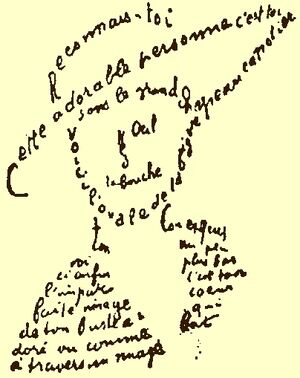
Apollinaire's calligramme (1918)

The Chinese poem Quatrain on Heavenly Mountain by Emperor Gaozong of Song; fan mounted as album leaf on silk, four columns in cursive script
A poet is a person who writes poetry. A poet's work can be literal, meaning that his work is derived from a specific event, or metaphorical, meaning that his work can take on many meanings and forms. The English term "poet" is derived from the Latin first-declension masculine noun "poeta, poetae" (literally meaning "poet, of the poet").
Definition
Poet (poet) n. Po"et [F. poëte, L. poëta, fr. Gr. (?), fr. (?) to make. Cf. Poem.]
- One skilled in making poetry; one who has a particular genius for metrical composition; the author of a poem; an imaginative thinker or writer. "The poet's eye, in a fine frenzy rolling, Doth glance from heaven to earth, from earth to heaven". Shak . "A poet is a maker, as the word signifies." Dryden .
History
- Main article: History of poetry
Poets have existed since antiquity, in nearly all languages, and have produced works that vary greatly in different cultures and time periods.Orban, Clara Elizabeth (1997). The Culture of Fragments: Word and Images in Futurism and Surrealism. Rodopi. p. 3. ISBN 90-420-0111-9. http://books.google.com/books?id=KbCVyt6MWg0C. Throughout each civilization and language, poets have used various styles that have changed through the course of literary history, resulting in a history of poets as diverse as the literature they have produced.
Poet as seer
French poet Arthur Rimbaud summarized the role of the "poet" by writing:
- I say that one must be a seer, make oneself a seer. The poet makes himself a seer by a long, prodigious, and rational disordering of all the senses. Every form of love, of suffering, of madness; he searches himself, he consumes all the poisons in him, and keeps only their quintessences. This is an unspeakable torture during which he needs all his faith and superhuman strength, and during which he becomes the great patient, the great criminal, the great accursed – and the great learned one! – among men. – For he arrives at the unknown! Because he has cultivated his own soul – which was rich to begin with – more than any other man! He reaches the unknown; and even if, crazed, he ends up by losing the understanding of his visions, at least he has seen them! Kwasny (2004), 147.
- Je dis qu’il faut être voyant, se faire voyant. Le Poète se fait voyant par un long, immense et raisonné dérèglement de tous les sens. Toutes les formes d'amour, de souffrance, de folie; il cherche lui-même, il épuise en lui tous les poisons, pour n'en garder que les quintessences. Ineffable torture où il a besoin de toute la foi, de toute la force surhumaine, où il devient entre tous le grand malade, le grand criminel, le grand maudit, – et le suprême Savant! – Car il arrive à l'inconnu! Puisqu'il a cultivé son âme, déjà riche, plus qu'aucun! Il arrive à l'inconnu, et quand, affolé, il finirait par perdre l'intelligence de ses visions, il les a vues!"A Paul Demeny, 15 mai 1871". Abelard.free.fr. Retrieved on May 12, 2011.
See also
Template:Portal Template:Sister Template:Sister
- List of poets
References
External links
- Representative Poetry Online
| This page uses Creative Commons Licensed content from Wikipedia. (view article). (view authors). |
| This page uses content from Wikinfo . The original article was at Wikinfo:Poet. The list of authors can be seen in the (view authors). page history. The text of this Wikinfo article is available under the GNU Free Documentation License and the Creative Commons Attribution-Share Alike 3.0 license. |